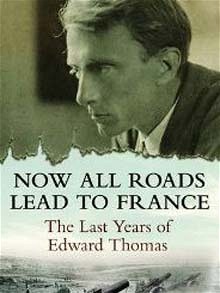Edward Thomas, the Other WWI Poet

Between the trench warfare of the second season of Downton Abbey and an extraordinary new memoir by Matthew Hollis, it’s worth taking some time to explore the writing of one of the truly great British pre-modernist poets of the early twentieth century.
Thomas is often overshadowed by Sassoon and Owen (particularly after Pat Barker’s excellent Regeneration), and is a bit of a poet’s poet, worshiped by Hughes and Heaney, among others, but not widely read. His finest work tends to be muted and pastoral in nature (I lovingly think of the genre as “Hobbit poetry”) minus the guns-and-gas quality of wartime work more likely to be popularly anthologized.
A personal favorite, “As The Team’s Head-Brass,” is worth lugubriously trotting out in full:
As the team’s head-brass flashed out on the turn
The lovers disappeared into the wood.
I sat among the boughs of the fallen elm
That strewed the angle of the fallow, and
Watched the plough narrowing a yellow square
Of charlock. Every time the horses turned
Instead of treading me down, the ploughman leaned
Upon the handles to say or ask a word,
About the weather, next about the war.
Scraping the share he faced towards the wood,
And screwed along the furrow till the brass flashed
Once more.
The blizzard felled the elm whose crest
I sat in, by a woodpecker’s round hole,
The ploughman said. ‘When will they take it away? ‘
‘When the war’s over.’ So the talk began –
One minute and an interval of ten,
A minute more and the same interval.
‘Have you been out? ‘ ‘No.’ ‘And don’t want to, perhaps? ‘
‘If I could only come back again, I should.
I could spare an arm, I shouldn’t want to lose
A leg. If I should lose my head, why, so,
I should want nothing more…Have many gone
From here? ‘ ‘Yes.’ ‘Many lost? ‘ ‘Yes, a good few.
Only two teams work on the farm this year.
One of my mates is dead. The second day
In France they killed him. It was back in March,
The very night of the blizzard, too. Now if
He had stayed here we should have moved the tree.’
‘And I should not have sat here. Everything
Would have been different. For it would have been
Another world.’ ‘Ay, and a better, though
If we could see all all might seem good.’ Then
The lovers came out of the wood again:
The horses started and for the last time
I watched the clods crumble and topple over
After the ploughshare and the stumbling team.
Something to think about, with Thomas, is that there is a sense in which he was killed by poetry. He was old enough, and married enough, to avoid being conscripted, but chose to enlist after struggling with his friend Robert Frost’s “The Road Not Taken,” an idea that should cause most of us to shift uncomfortably in our seats when said poem gets broken out at middle school graduations or CEO retirement functions. It can seem easy to drift from Wallace Stevens’ idea of the poem as the “cry of its occasion,” and both curious and humbling to remember its power to overwhelm.